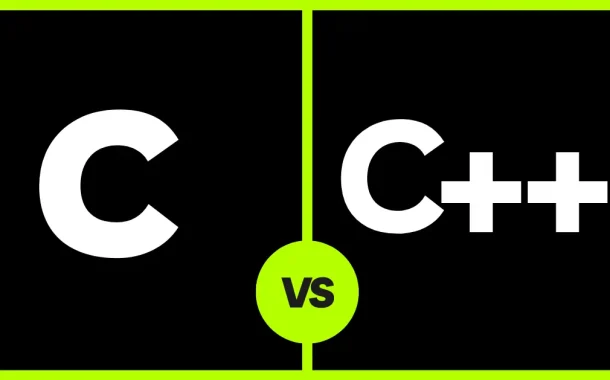The purpose of comparing C and C++ is to understand their differences. C is often used for system-level programming and embedded systems due to its straightforward nature. C++, with its added features, is used for larger software projects, including game development and applications requiring complex data structures.
Table of Contents
Table of Contents
Core Differences
Language Paradigms
C is a procedural programming language, which means it focuses on writing functions to perform tasks. It emphasizes a sequence of steps to operate on data, making it ideal for tasks that require straightforward, step-by-step logic. C++ extends C by incorporating object-oriented programming (OOP).
This paradigm allows developers to use classes and objects, enabling them to model real-world entities and their interactions. OOP in C++ helps in organizing code better, making it easier to manage and maintain large codebases. This includes concepts like encapsulation, inheritance, and polymorphism.
Syntax and Structure
C has a relatively simple syntax and structure, making it easy to learn and use for basic programming tasks. It relies on functions to perform operations and has a straightforward approach to data handling. C++ builds upon C’s syntax by adding more features. For instance, C++ introduces classes, which are blueprints for creating objects.
These classes can have methods (functions) and properties (data), allowing for more complex and organized code. C++ also supports templates and exception handling, which are not present in C. These additions enable more flexible and robust programming solutions.
Memory Management
Manual Memory Management in C
In C, memory management is manual. Developers must explicitly allocate and deallocate memory using functions like malloc, calloc, realloc, and free. This approach gives developers control over how memory is used, but it also places the responsibility on them to avoid memory leaks and other issues.
Improper management can lead to problems such as memory leaks, where memory that is no longer needed is not released, or dangling pointers, where memory is accessed after it has been freed.
Dynamic Memory Management in C++
C++ extends C’s memory management capabilities by introducing operators such as new and delete. These operators simplify memory allocation and deallocation. The new operator allocates memory for an object or array and returns a pointer to it, while delete deallocates memory that was previously allocated.
C++ also offers smart pointers, like std::unique_ptr and std::shared_ptr, through the Standard Library. These smart pointers automatically manage memory and help prevent common issues like memory leaks and dangling pointers, making memory management safer and easier.
Standard Libraries
C Standard Library
The C Standard Library provides a set of built-in functions that are essential for performing common tasks. These functions cover various areas such as input and output, string manipulation, memory allocation, and mathematical operations. Examples include printf for output, scanf for input, and malloc for dynamic memory allocation. The C Standard Library is designed to be simple and efficient, focusing on providing fundamental tools needed for basic programming tasks.
C++ Standard Library and STL
The C++ Standard Library extends the functionality of the C Standard Library with additional features tailored to object-oriented programming. It includes components like the Standard Template Library (STL), which provides powerful and flexible data structures such as vectors, lists, and maps. The STL also includes algorithms for sorting, searching, and manipulating data. This library simplifies complex programming tasks and promotes code reuse and efficiency. Overall, the C++ Standard Library enhances the language’s capabilities by offering a wide range of tools and utilities for modern programming needs.
Error Handling
Error Handling in C
In C, error handling is typically managed using return codes and manual checks. Functions often return a specific value to indicate success or failure, and it’s up to the programmer to check these values and handle errors accordingly. For example, a function that fails to open a file might return NULL, and the programmer must check this return value to handle the error properly. This approach requires careful management and can make the code more prone to errors if not handled consistently.
Exception Handling in C++
C++ improves error handling with its built-in exception handling mechanisms. It uses try, catch, and throw keywords to handle errors. When an exception is thrown using the throw keyword, it transfers control to the nearest catch block that can handle the exception. This method allows for more structured and manageable error handling, as exceptions can be caught at different levels of the program. It also separates error-handling code from regular code, making the program more readable and easier to maintain.
Use Cases and Applications
Common Applications of C
C is widely used in system-level programming and embedded systems due to its efficiency and low-level access to hardware. It’s the language of choice for operating systems, device drivers, and other software that requires direct manipulation of hardware.
C is also popular in developing high-performance applications where speed and memory control are crucial, such as game engines, real-time systems, and scientific computing applications. Its simplicity and control over system resources make it ideal for applications where performance and efficiency are top priorities.
Common Applications of C++
C++ is used in a variety of complex and large-scale software projects. Its object-oriented features make it suitable for developing applications that require sophisticated data management, such as desktop applications, video games, and simulations. C++ is also employed in financial systems, real-time simulations, and large-scale enterprise applications.
The ability to use classes and objects helps in organizing code more effectively, making C++ a preferred choice for projects that involve complex systems and require robust and maintainable code. Its flexibility and extensive library support enhance its versatility in various domains.
Conclusion
C and C++ are both powerful programming languages, each with its strengths. C is known for its simplicity and efficiency, making it ideal for system-level programming and applications where performance is critical. Its procedural approach keeps things straightforward but requires careful management of resources.
C++, on the other hand, builds on C with added features like object-oriented programming. This makes C++ suitable for more complex projects that need better code organization and reuse. The ability to handle objects and use advanced libraries helps in developing large-scale applications with more flexibility.














